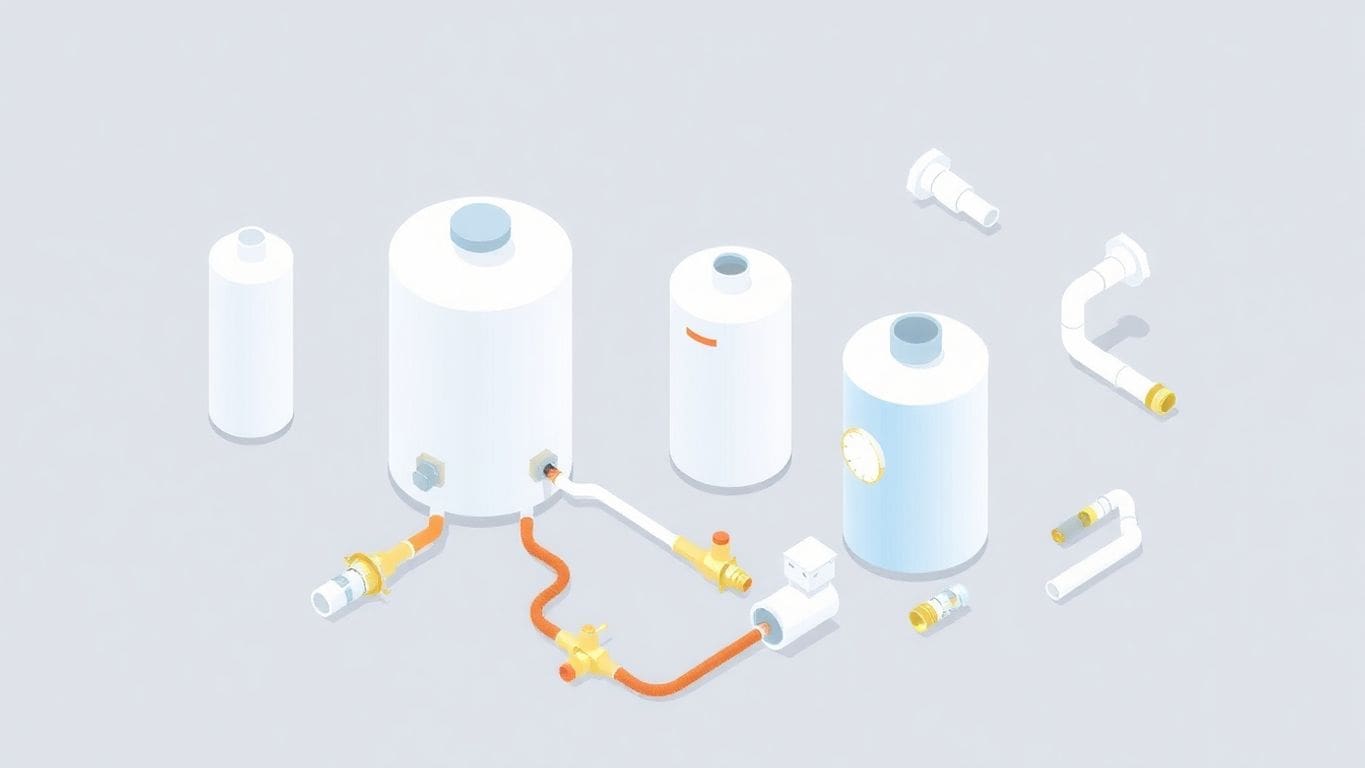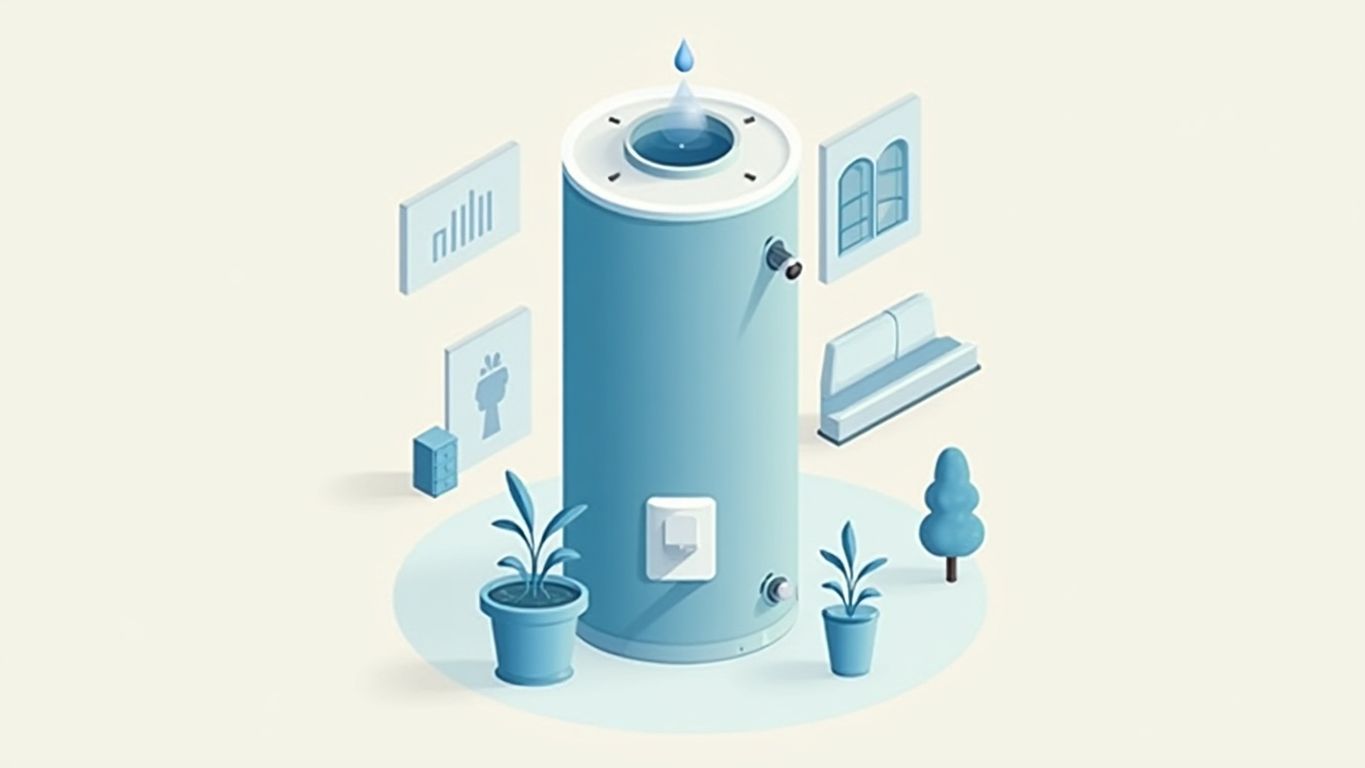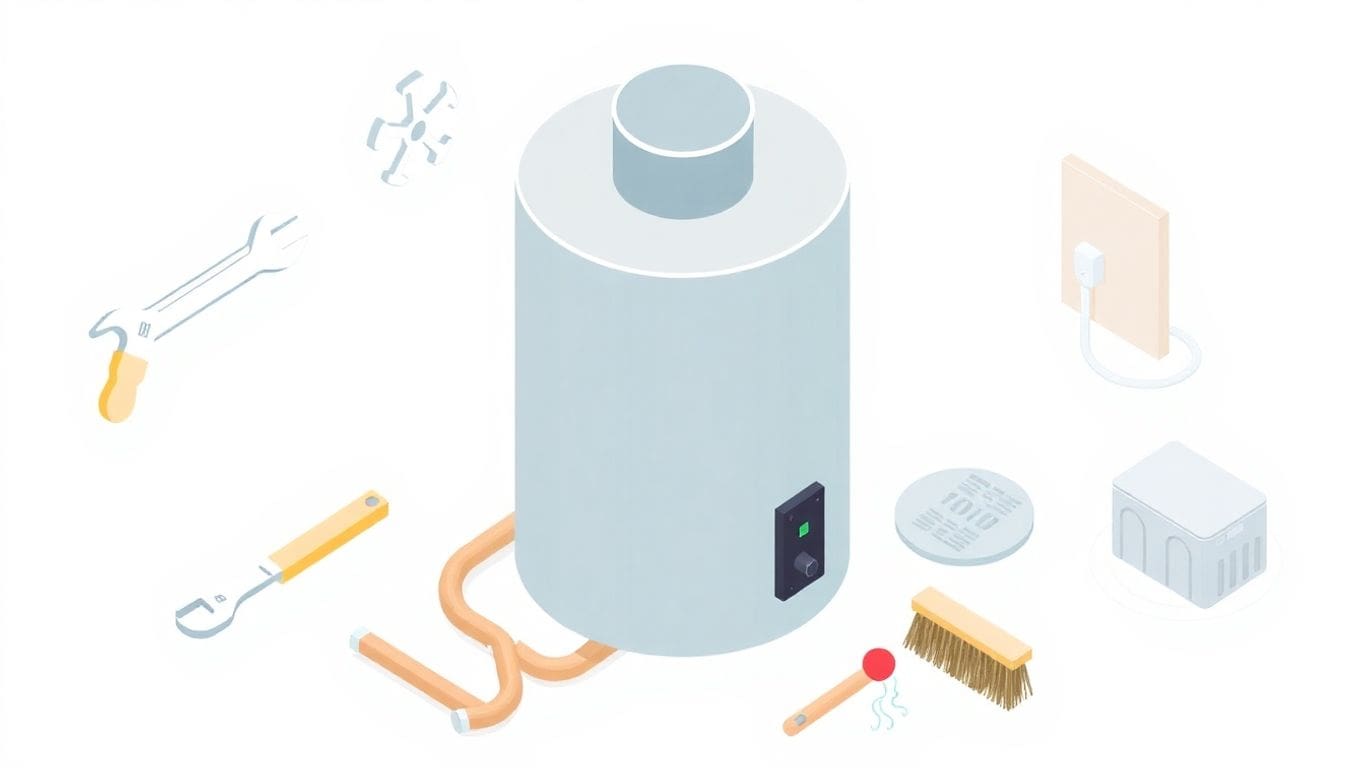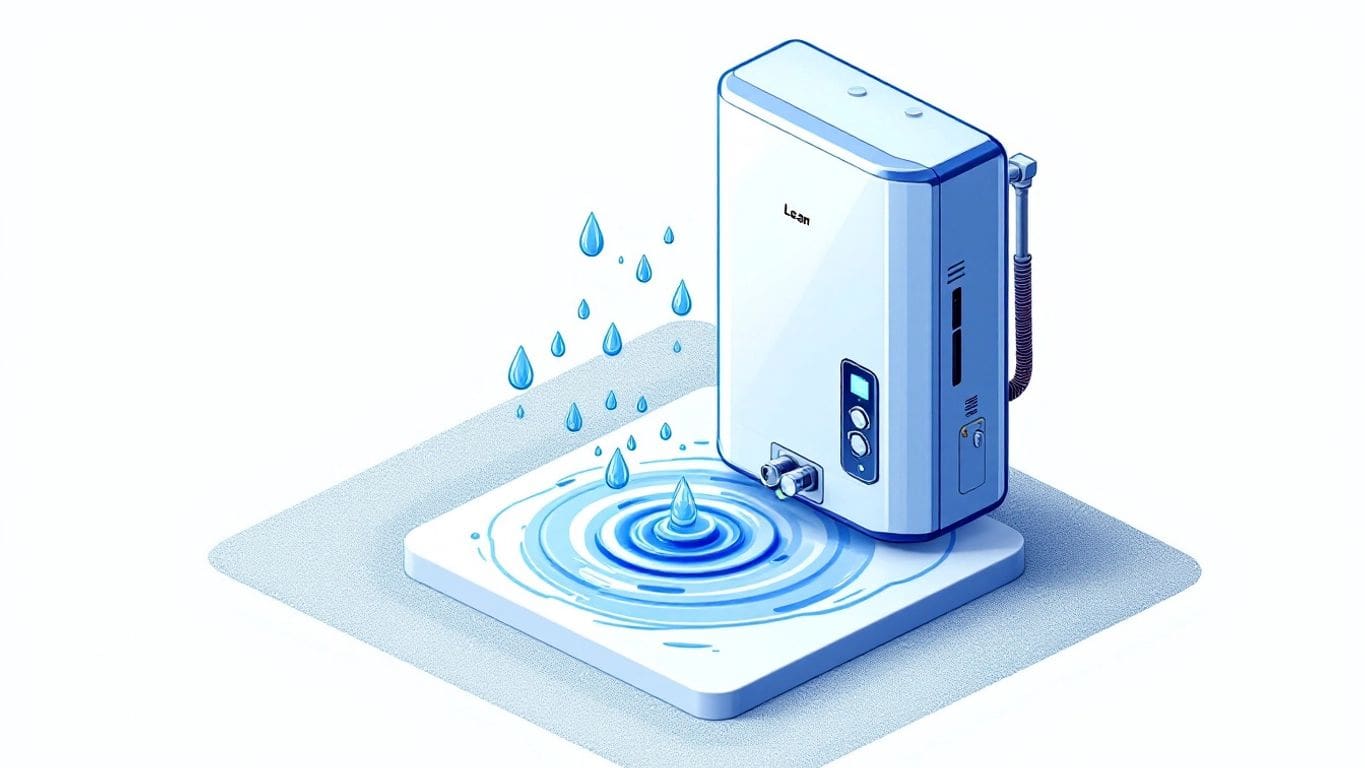If your water heater is around 15 years old, it’s time to take a closer look. Knowing when to replace it can save you from unexpected problems, costly repairs, and even safety issues. This guide will help you understand the signs that indicate it’s time for a new water heater, the benefits of replacing an old unit, and what to consider when making the switch.
Key Takeaways
- A water heater typically lasts about 10 to 15 years, so if yours is 15 years old, it’s nearing the end of its life.
- Look for signs like rust, leaks, or strange noises; these could mean your water heater is failing.
- Replacing an old water heater can improve energy efficiency and save you money on bills.
- Consider the type and size of the new water heater to ensure it fits your home’s needs.
- Plan for installation and possible permits if you decide to replace your water heater.
Understanding the Lifespan of a Water Heater
Average Lifespan Expectations
Most water heaters last about 10 to 15 years. However, some can last longer with proper care. If your water heater is 15 years old, it’s time to pay attention. You might need to think about replacing it soon.
Signs Your Water Heater is Aging
Look for these signs:
- Rust on the tank or pipes.
- Strange noises like popping or rumbling.
- Water leaks around the base.
These can be signs that your water heater is nearing the end of its life.
Factors Affecting Longevity
Several things can affect how long your water heater lasts:
- Quality of the unit: Some brands are built to last longer.
- Maintenance: Regular checks and cleaning can help.
- Water quality: Hard water can cause buildup and damage.
Remember, regular maintenance can help extend the life of your water heater. If you notice any signs of aging, it’s best to act quickly to avoid bigger problems later.
If you’re unsure about your water heater’s condition, consider having a professional take a look. Keeping an eye on these factors can save you from unexpected costs and ensure you have hot water when you need it.
Why a 15-Year-Old Water Heater Might Need Replacement

Potential Risks of an Old Water Heater
A water heater that is 15 years old can be a risk. It may not work as well as it used to. Here are some risks to think about:
- Leaks: Older units can start to leak, causing water damage.
- Breakdowns: They are more likely to break down when you need hot water.
- Inefficiency: They may use more energy, leading to higher bills.
Cost Implications of Waiting
Waiting to replace your old water heater can cost you more in the long run. Here’s why:
- Emergency Repairs: If it breaks suddenly, you might pay more for emergency service.
- Water Damage: A leak can damage your home, leading to costly repairs.
- Higher Energy Bills: An old heater can waste energy, increasing your monthly costs.
Safety Concerns to Consider
Safety is important when it comes to old water heaters. Here are some concerns:
- Gas Leaks: If you have a gas water heater, it can leak gas, which is dangerous.
- Scalding Risks: Older heaters may not regulate temperature well, leading to burns.
- Carbon Monoxide: If it’s gas-powered, it can produce carbon monoxide, which is harmful.
Replacing your water heater before it fails can save you money and keep your home safe.
Evaluating the Condition of Your Water Heater
Checking for Rust and Corrosion
Look for any signs of rust or corrosion on your water heater. Rust can weaken the tank and lead to leaks. Check the outside and inside if possible. If you see rust, it might be time to think about a replacement.
Inspecting the Anode Rod
The anode rod helps prevent rust inside the tank. You can check it by removing it from the heater. If it’s mostly gone or just a wire, your tank may not last much longer. Replacing the anode rod can extend the life of your water heater.
Assessing Water Quality and Sediment
Check the water quality coming from your heater. If you notice a strange smell or color, it could mean there’s sediment buildup. Sediment can cause your heater to work harder and may lead to damage.
Here’s a quick checklist to help you evaluate your water heater:
- Look for rust or leaks.
- Check the anode rod condition.
- Test the water quality.
Regular checks can help you catch problems early. This way, you can avoid a big mess and costly repairs later.
Benefits of Replacing an Aging Water Heater
Energy Efficiency Improvements
Replacing your old water heater can lead to better energy efficiency. New models use less energy to heat water. This means lower utility bills for you. You can save money each month.
Enhanced Safety Features
New water heaters come with better safety features. They are designed to prevent leaks and other issues. This can give you peace of mind. You won’t have to worry as much about accidents.
Potential Cost Savings
While buying a new water heater costs money, it can save you in the long run. Here are some ways it can help:
- Lower energy bills due to better efficiency.
- Fewer repairs since new units are less likely to break down.
- Increased home value if you decide to sell your house later.
Replacing your old water heater can be a smart choice. It can save you money and keep your home safe.
Choosing the Right Replacement for Your Home

When it’s time to replace your water heater, you have choices. Choosing the right one is important for your home. Here are some things to think about:
Types of Water Heaters Available
- Tank Water Heaters: These are the most common. They store hot water in a tank.
- Tankless Water Heaters: These heat water on demand. They save space and energy.
- Heat Pump Water Heaters: These use electricity to move heat from the air or ground to heat water.
Energy Source Considerations
- Electric: Easy to install and maintain.
- Gas: Usually heats water faster and can be cheaper to run.
- Solar: Eco-friendly but can be expensive to install.
Size and Capacity Requirements
- Small Households: A 30-40 gallon tank may be enough.
- Medium Households: A 40-50 gallon tank is often suitable.
- Large Households: Consider a 50-80 gallon tank or a tankless model.
Remember, the right water heater can save you money and energy. Take your time to choose wisely!
Installation Considerations for a New Water Heater
When it’s time to replace your water heater, there are a few important things to think about. Choosing the right installation method can save you time and money. Here are some key points to consider:
Professional Installation vs. DIY
- Professional Installation: Hiring a plumber ensures the job is done right. They know the local codes and can handle any issues that come up.
- DIY Installation: If you are handy, you might consider doing it yourself. Just make sure you understand the process and have the right tools.
- Safety First: Always prioritize safety. If you’re unsure, it’s best to call a professional.
Location and Space Requirements
- Space: Make sure you have enough room for the new water heater. Measure the area where it will go.
- Ventilation: If you choose a gas water heater, ensure there is proper ventilation to avoid dangerous gas buildup.
- Accessibility: Place the heater where it’s easy to reach for maintenance and repairs.
Permits and Regulations
- Check Local Codes: Some areas require permits for water heater installation. Check with your local building department.
- Follow Regulations: Make sure your installation meets safety standards. This can prevent future problems.
- Insurance: Inform your insurance company about the new installation to keep your coverage up to date.
Remember, taking the time to plan your installation can lead to a smoother process and a more efficient water heater.
Financial Aspects of Replacing Your Water Heater
When it comes to replacing your water heater, understanding the costs is very important. You want to make sure you are prepared financially. Here are some key points to consider:
Budgeting for a New Water Heater
- Initial Costs: The price of a new water heater can vary. On average, you might spend between $800 to $2,500, including installation.
- Long-Term Savings: A new, energy-efficient model can save you money on your energy bills. This can add up to hundreds of dollars over the years.
- Unexpected Costs: Be ready for extra expenses. If your old heater leaks, you might need to fix water damage or replace pipes.
Exploring Rebates and Incentives
- Check with your local utility company. They often have rebates for energy-efficient water heaters.
- Look for federal or state tax credits. These can help lower your overall costs.
- Some stores offer discounts or financing options. This can make buying a new heater easier on your wallet.
Financing Options Available
- Personal Loans: You can take out a loan to cover the cost of a new water heater.
- Credit Cards: Some credit cards offer cash back on home improvement purchases.
- Payment Plans: Many companies provide payment plans. This allows you to pay over time instead of all at once.
Remember, waiting too long to replace your water heater can lead to higher costs later. It’s better to plan ahead and avoid surprises.
Maintenance Tips for Extending the Life of Your New Water Heater
Keeping your water heater in good shape is important. Here are some simple tips to help you extend its life:
Regular Flushing and Cleaning
- Flush the tank at least once a year. This helps remove sediment that can build up over time.
- Use a hose to drain the tank. Let the water flow out until it runs clear.
- This process can help your heater run more efficiently.
Monitoring the Anode Rod
- Check the anode rod every few years. This rod helps prevent rust inside the tank.
- If it looks worn down or is mostly gone, replace it. A new rod can protect your tank for several more years.
- Remember, a healthy anode rod means a longer-lasting water heater.
Scheduling Professional Inspections
- Have a professional check your water heater every few years. They can spot problems you might miss.
- Regular inspections can save you money in the long run by catching issues early.
- Keeping up with maintenance can help your heater last longer.
Taking care of your water heater is like taking care of a car. Regular maintenance can help it run smoothly and last longer.
Environmental Impact of Water Heater Replacement
When you think about replacing your water heater, consider the environmental effects. Old water heaters can waste energy and water. Here are some important points to keep in mind:
Recycling Your Old Water Heater
- Many parts of your old water heater can be recycled. This helps reduce waste.
- Check with local recycling centers to see if they accept water heaters.
- Some companies will pick up your old unit for free if you buy a new one.
Choosing Eco-Friendly Models
- Look for water heaters with high energy efficiency ratings. These use less energy and save you money.
- Consider tankless water heaters. They heat water on demand and can be more efficient.
- Solar water heaters are another option. They use sunlight to heat water, which is great for the environment.
Reducing Your Carbon Footprint
- By replacing an old water heater, you can lower your carbon footprint. This means you help reduce pollution.
- Newer models often have better insulation, which keeps heat in and saves energy.
- Regular maintenance of your new heater can also help it run efficiently for longer.
Remember, making smart choices about your water heater can help protect our planet for future generations.
By understanding these points, you can make a more informed decision about your water heater replacement. It’s not just about comfort; it’s about caring for the environment too!
Common Mistakes to Avoid When Replacing Your Water Heater
When it’s time to replace your water heater, there are some common mistakes you should avoid. Being aware of these can save you time and money.
Ignoring Early Warning Signs
- Look for signs that your water heater is failing. These can include:
- Strange noises coming from the unit.
- Water pooling around the base.
- Fluctuating water temperatures.
Ignoring these signs can lead to bigger problems later.
Choosing the Wrong Size
- Make sure to choose a water heater that fits your home’s needs. Consider:
- The number of people in your household.
- Your hot water usage habits.
- The space available for installation.
A unit that is too small will not meet your needs, while one that is too large can waste energy.
Overlooking Maintenance Needs
- After installing a new water heater, don’t forget about maintenance. Regular care can extend its life. Remember to:
- Flush the tank at least once a year to remove sediment.
- Check the anode rod every few years.
- Schedule professional inspections as needed.
Taking care of your water heater can help it last longer and work better.
By avoiding these mistakes, you can ensure a smoother replacement process and a more efficient water heater.
Planning for Future Replacements
Setting Up a Replacement Fund
It’s smart to plan ahead. Start saving money now for your next water heater. Here are some tips:
- Set aside a small amount each month.
- Open a separate savings account just for this purpose.
- Keep track of your savings progress.
Understanding Warranty Terms
When you buy a new water heater, check the warranty. A warranty is a promise from the manufacturer. It tells you how long the heater should last and what repairs are covered. Make sure to:
- Read the warranty carefully.
- Know what is included and what is not.
- Keep your receipt and warranty information safe.
Keeping Up with Technological Advances
Water heaters are getting better every year. New models can save you money and energy. Stay informed by:
- Researching the latest water heater technology.
- Asking professionals about the best options.
- Considering energy-efficient models that can lower your bills.
Planning for future replacements can save you time and money. By being proactive, you can avoid unexpected problems and costs.
Frequently Asked Questions
How long does a water heater usually last?
Most water heaters last about 10 to 15 years. If yours is 15 years old or more, it might be time to think about replacing it.
What are the signs that my water heater is failing?
Look for rust, leaks, strange noises, or if the water isn’t getting hot enough. These could all mean your water heater needs to be replaced.
Is it better to replace a water heater before it breaks?
Yes, replacing it before it fails can save you from unexpected problems and costs, especially if it’s in a tricky spot like an attic.
What should I consider when choosing a new water heater?
Think about the type of water heater, its size, energy source, and how much hot water your household needs.
Can I install a new water heater myself?
While some people do it themselves, it’s often best to hire a professional. They know the rules and can do it safely.
Are there any financial help options for replacing my water heater?
Yes, check for rebates, tax credits, or special financing options that can help lower the cost.
What can I do to make my new water heater last longer?
Regularly flush it, check the anode rod, and schedule professional inspections to keep it in good shape.
What happens to my old water heater?
You can recycle it, or some places offer pickup for old units. Make sure to choose an eco-friendly model for your new one.






